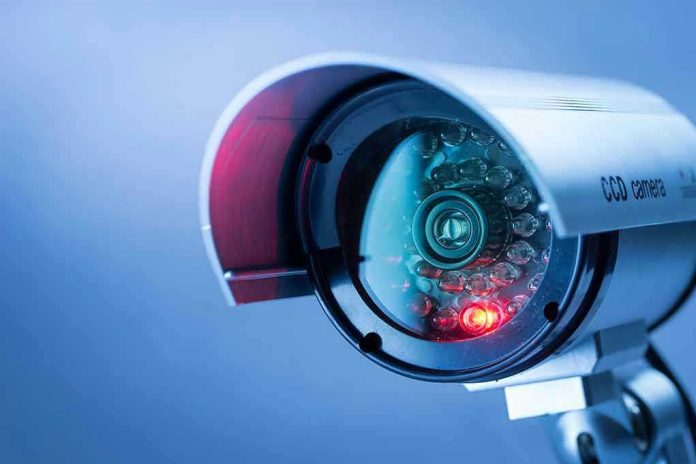
Americans who cherish their privacy and constitutional rights are staring down the barrel of a future where the government—and Big Tech—can peer straight into your living room, thanks to a tidal wave of advanced surveillance technology that makes George Orwell look like an optimist.
At a Glance
- AI-powered surveillance cameras and monitoring tools have exploded across the U.S., with over 85 million cameras deployed as of 2025.
- Federal agencies and tech giants are pushing the limits of privacy, with little meaningful oversight or regulation.
- Public opinion is deeply divided: some Americans want more security, while nearly half fear for their privacy and civil liberties.
- Lawsuits and local bans are mounting, but the relentless advance of surveillance tech continues to outpace policy and the Constitution.
AI Surveillance Is Spying on Americans—And No One Is Stopping It
Americans are now living in the golden age of surveillance—if you can call it golden—where the latest “smart” cameras and software don’t just watch the front door, they track, record, and analyze your every move. Over 85 million AI-driven cameras blanket U.S. streets, neighborhoods, and businesses. Cities like Atlanta have more cameras per square mile than entire countries did just a decade ago, all in the name of “public safety.” The government and tech companies are raking it in as the surveillance market heads toward $25 billion by 2030—talk about crony capitalism run amok.
Privacy is a God-given right — invasive tech has NO place in a free society.https://t.co/IUDGRVzErk
— LifeSiteNews (@LifeSite) July 25, 2025
Tech giants like Amazon and Palantir, along with surveillance startups, are pushing facial recognition, license plate readers, and even “predictive policing”—software that guesses who might commit a crime next. Federal agencies like DHS and the FBI gobble up this data and now even monitor your social media for “extremist” posts. Meanwhile, the American people are split: 44% beef up their own security, but 47% are worried about becoming prisoners in their own homes. And who can blame them? With the government’s track record, every new camera could be another nail in the coffin of the Fourth Amendment.
This Is Not About Safety—It’s About Control
Supporters of these systems claim they make us safer. But do they? Or do they just give the government and their Big Tech buddies more power to monitor, intimidate, and manipulate law-abiding citizens? Remember programs like PRISM and Project Green Light? They promised security but delivered mass data collection and a chilling effect on free speech and assembly. The so-called “benefits” of this surveillance state are always exaggerated, while the damage to civil liberties and trust in our institutions is swept under the rug.
Several U.S. cities—San Francisco, Portland—have tried to ban facial recognition technology for government use. Why? Because even the leftists in those cities realized it’s a tool for abuse, not just safety. But the bans are patchwork, and the federal government keeps pushing forward, often in secret. DHS now admits to using AI and digital tools to scan visa applicants’ social media for “extremism.” The EPA, of all agencies, has had to deny using AI to target employees for political reasons. When even bureaucrats are forced to deny spying, you know things are out of control.
Stakeholders and the Real Agenda: Money and Power
The major players in this dystopian drama are federal agencies (DHS, FBI, NSA), Big Tech (Amazon, Palantir, Flock Safety), and local governments eager for federal dollars. Their motivations are clear: more power, more profit, more control. Privacy advocates like the ACLU are fighting back, but they’re outgunned and outspent. The general public is left to pick sides—safety or freedom—when the real answer should be both. Instead, we get neither.
Every time new surveillance tech is rolled out, we hear the same tired lines about “keeping us safe.” But it’s not about protecting Americans; it’s about building a system where the government can monitor, intimidate, and punish dissenters. Civil liberties experts warn that mass surveillance will erode trust, normalize government intrusion, and set dangerous precedents for abuse. The courts and Congress are lagging behind, and the tech industry’s lobbyists are writing the rules—if any exist at all.
What Happens If We Don’t Ban This Technology?
Unchecked, these technologies will turn every home, street, and device into a potential government informant. The short-term impact? Maybe a few more crimes deterred, but at the cost of chilling free speech and assembly. The long-term consequences are even more chilling: a society where privacy is a relic, dissent is dangerous, and every American is a suspect waiting to happen.
Minorities, political activists, and everyday citizens will be disproportionately targeted. Data breaches will become routine. The surveillance industry will keep growing—until public backlash or a major scandal forces change. Already, lawsuits and legislation are mounting, but the surveillance state is a freight train with no brakes. The only logical solution? Ban these invasive technologies now, before the America we know is lost for good.







